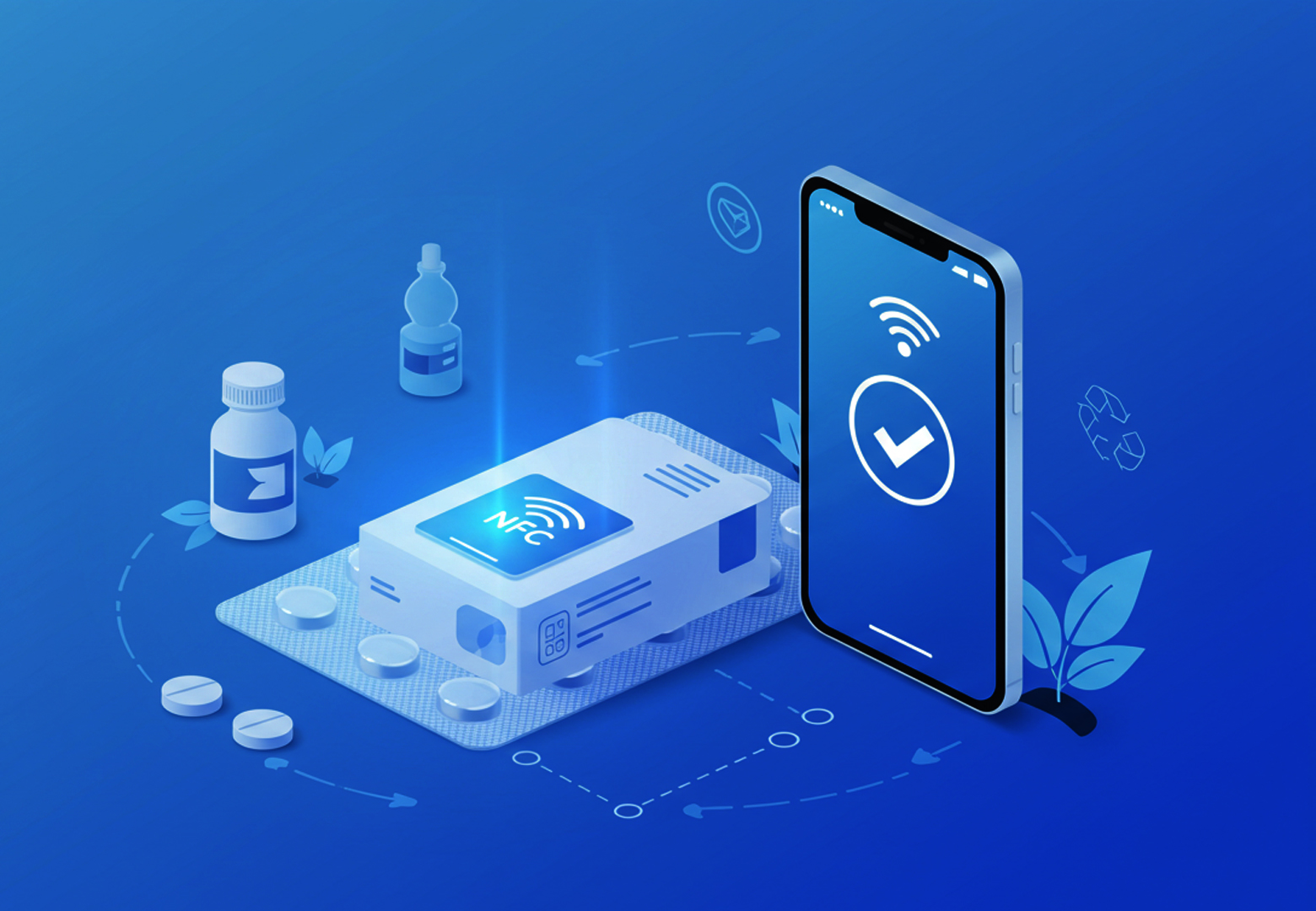Introduction
The pharmaceutical industry faces two urgent challenges:
- Counterfeit drugs and costly recalls that undermine patient safety and trust.
- Sustainability mandates and consumer pressure to reduce packaging waste.
The solution? Smart labels powered by NFC (Near-Field Communication) and dynamic product data. These digital-first labels make each product verifiable, traceable, and updateable — reducing both environmental waste and the risk of fraud.
For pharmaceutical companies, smart labels are more than compliance tools. They are a competitive advantage in protecting patients and meeting regulatory goals.
How Smart Labels Reduce Waste
1. Eliminate Paper Inserts with ePIs
Printed leaflets in every pack generate tons of waste — and often go unread. A recent EU study found that removing paper inserts from hospital-only medicines could save 80 tons of paper annually.
With smart labels, patients and professionals simply tap their phone for the latest, localized instructions. Content can be updated in real time, reducing errors and waste.
👉 See how this aligns with our anti-counterfeit packaging solutions.
2. Reduce Recalls and Product Destruction
Recalls are often caused not by unsafe drugs but by outdated printed instructions.
With ForgeStop’s InfoTap™ smart labels, pharma companies can:
- Push new dosage or safety alerts directly to the digital label
- Deliver instant recall instructions to patients and pharmacists
- Avoid destroying usable stock
For more, explore reducing pharmaceutical recalls with smart labels.
3. Enable Recyclability and Transparency
Pharmaceutical packaging often mixes plastics, foils, and adhesives that complicate recycling. Smart labels enable:
- Digital disposal instructions based on region
- Transparent product composition data for recyclers
- Use of eco-friendly substrates like paper-based NFC inlays and bio-based adhesives
Learn more in our article on sustainable connected packaging.
Fighting Counterfeits in the Supply Chain
The WHO estimates 1 in 10 medicines in low- and middle-income countries is falsified — often with dangerous consequences.
Smart labels strengthen protection by enabling:
- Instant consumer authentication with a smartphone
- Distributor verification for tampering or diversion
- Regulator traceability through serialization and UID logging
Every scan builds trust — and creates a secure audit trail.
Real-World Use Cases
- ForgeStop Client: Eco-Friendly Patient Info
Replaced a 12-page paper insert with a smart label → reduced paper, lowered shipping weight, and enabled instant recall updates. - Clinical Trials
Sponsors are piloting dynamic labeling to update trial kits remotely. NFC smart labels deliver similar benefits at a lower cost than digital display labels. - ePIs in EMA/FDA Pilots
Agencies in the EU, US, Japan, and Brazil are piloting digital patient information. NFC smart labels make compliance seamless — no app required.
Regulatory Changes Pharma Must Prepare For
| Regulation |
Impact |
Timeline |
| EU PPWR |
Digital identifiers, recyclability disclosures, packaging waste reduction |
2025–2026 |
| ePI Initiatives (EMA/FDA) |
Shift from paper inserts to digital access for patient info |
Pilots now; mainstream by 2026+ |
| Digital Product Passports (DPPs) |
Traceability + sustainability data at item level |
2027+ |
| GS1 / DSCSA / FMD |
Serialization and end-to-end track & trace |
Active now |
Why ForgeStop Leads
ForgeStop’s InfoTap™ + BatchMaker platform delivers:
- Dynamic product pages tailored by batch or region
- Tamper-aware UID scans
- Pharma-ready ePI hosting
- Multilingual digital inserts
- Custom recyclable label designs
- Compliance-ready audit logs
- Dark web and diversion monitoring
- Integration with GS1 and SAP standards
Addressing Industry Concerns
| Concern |
ForgeStop’s Solution |
| “NFC is too expensive.” |
Low-cost paper-based inlays keep unit costs down; savings from fewer recalls, logistics, and fraud offset investment. |
| “What about labeling compliance?” |
Aligned with EMA/FDA ePI initiatives and GS1 standards; audit logs and region-specific delivery built in. |
| “We need access control on digital content.” |
Region-locked, UID-locked, or batch-tied content with expiring tokens and role-based access. |
| “Will this scale for high-volume SKUs?” |
BatchMaker supports high-throughput encoding; rules and redirects can be automated at lot/batch/region level. |
Final Word
Sustainability and anti-counterfeiting aren’t competing goals — they’re two sides of the same smart label.
ForgeStop helps pharma brands:
- Cut waste (paper, packaging, recalls)
- Build trust (counterfeit protection)
- Stay compliant (ePI, serialization, ESG)
- Connect directly with patients and pharmacists
👉 Contact ForgeStop to pilot smart labels for your next product line.
